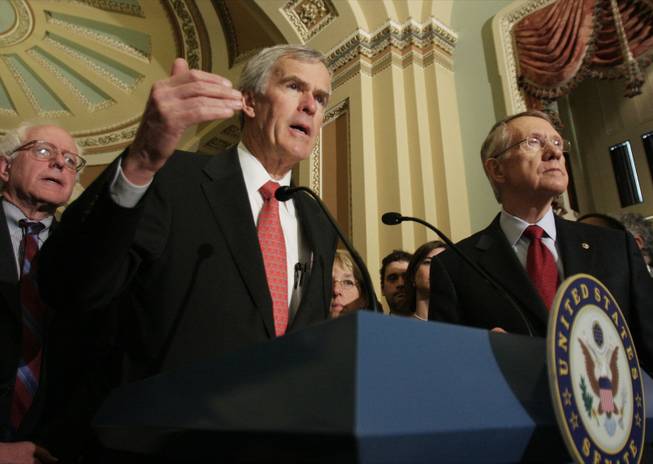
Associated Press
Sen. Jeff Bingaman, D-N.M., speaks about gas prices as Senate Majority Leader Harry Reid, right, and Sen. Bernie Sanders, I-Vt., left, listen in May 2008.
Wednesday, May 14, 2008 | 2 a.m.
Sun Archives
- Proposals to slash gas prices abound in White House race (5-01-2008)
- Gas, Oil Rise to Records As Dollar Falls (3-13-2008)
Beyond the Sun
- Senate calls for SPR halt in flood bill passage (05-13-2008)
- Oil stockpiling may get key tests today (05-12-2008)
- Senate Democrats seek to tax oil companies (05-08-2008)
So the next time you’re filling up the tank, here’s a pop quiz to consider as the dollars click by: What’s the best way to lower your gasoline bill?
Is it, as Republicans in Congress propose, drilling for more oil domestically, in places such as the Arctic National Wildlife Refuge, to reduce our dependence on supplies from the Middle East?
Or is it, as the Democrats suggest, forcing domestic oil companies to change their habits and threatening to tax them unless they invest in alternative energy technologies?
Don’t worry, you don’t need to come up with the answer anytime soon. Neither proposal is likely to pass in Congress this year, despite the hours of floor time being consumed by the issue.
Think of it as a practice quiz for the fall election, when you will need to decide which party you want in power in Washington.
Here are some of the basics, as told through the comments of Nevada’s two senators over the past few weeks as their parties tried to frame the debate.
For Republicans, the root problem of $4-a-gallon gas is supply.
Supply more oil, they say, and prices will go down. Even more, Republicans believe, just the promise of more oil flowing would ease the minds of speculators, who are helping to drive up prices.
“You want to affect the price at the pump today, you have to increase supplies,” Sen. John Ensign said in an interview Tuesday.
The Alaskan wildlife refuge, as well as the ocean waters off the nation’s coastlines, hold the Republicans’ answer to rising gas prices — even as members of their party have dramatically blocked past attempts to drill in pristine areas.
Ensign believes prices would “go down overnight,” as he put it last week, if speculators knew more oil was coming.
“When was the last time, just ask yourselves, you taxed something and got more of it?” Ensign said last week. “Is that going to increase supply? The answer is obviously not.”
But Democrats, led by Sen. Harry Reid, believe Republicans are relying on what environmentalists call an “old, dirty path” that Americans no longer believe in.
Democrats want to redirect the oil companies away from fossil fuels that are exacerbating global warming and toward development of alternative energy forms.
“We can’t drill our way out,” Reid told reporters in a conference call Tuesday afternoon.
The Democratic plan would roll back the $1.7 billion in annual tax breaks given to the top five domestic oil companies and put the money toward development of wind, solar and other renewable energies that could replace the fuel needed to power industry.
Even more, Democrats would start taxing the big oil companies’ “windfall” profits at 25 percent unless the companies reinvest their earnings in renewable energy. Democrats would also push tougher regulations on oil speculators.
Reid often talks about the $600 billion profits oil companies have made since the start of the Bush administration, while gas prices at home more than doubled.
“We are forcing oil companies to change their ways,” Reid said recently.
So take your pick.
As of now, nothing is likely to pass. The Republican proposal — to open up part of the Alaskan wildlife refuge for oil exploration — failed Tuesday in the Senate, 42-56, with a handful of Republicans, mostly those in difficult reelection campaigns, and one similarly positioned Democrat, voting against their parties.
The Democratic plan hasn’t come up for a vote. It, too, faces dissent from within Democratic ranks as key senators oppose taxing oil company profits.
The House is having similar debates.
Congress may find common ground on one front. Senators agreed, 97-1, to call on Bush to temporarily halt daily oil shipments to the Strategic Petroleum Reserve on the theory that if those supplies entered the retail marketplace instead, prices may be lowered. The House passed a similar bill by a veto-proof margin later Tuesday evening.

Join the Discussion:
Check this out for a full explanation of our conversion to the LiveFyre commenting system and instructions on how to sign up for an account.
Full comments policy